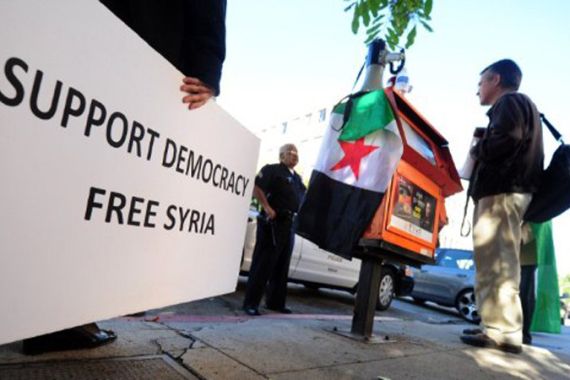Arab League to push Syria plan at UN
Move aimed at ending crackdown on protests will not seek military action, says Qatar’s prime minister.

Arab states may ask the UN Security Council to adopt an Arab peace plan aimed at ending a Syrian crackdown on protests but they will not seek military action, the Qatari prime minister has said.
Sheikh Hamad bin Jassim bin Jabr al-Thani told a news conference after a ministerial committee meeting in Doha on Saturday that Syria was delaying in its response to the peace plan presented by Arab states last month.
Arab foreign ministers will discuss the UN move at a meeting in Cairo on Wednesday, he said.
The Qatar PM said “if we can’t solve the crisis in Syria in the next couple of weeks, the crisis will be out of Arab control”.
Iraq team holds talks with Assad
Meanwhile, an Iraqi team held “positive” talks with Syrian President Bashar al-Assad on Saturday, its leader told AFP.
“I am on my way to Cairo for a meeting with the Arab League after holding positive talks with President Assad,” Falah al-Fayadh, Iraq’s national security adviser said.
| IN VIDEO |
| AJE’s Hashem Ahelbarra on the League meeting |
“We explained the Iraqi position,” he said, which is designed to bring a peaceful end to the ongoing clashes in a way that respects “the will of the Syrian people, in the framework of democratic change”.
Fayadh said his government’s proposal was also designed to restrict “foreign interference” and prevent sectarian conflict.
Nouri al-Maliki, Iraq’s prime minister, told AFP on Thursday that Baghdad wants to open a dialogue between the opposition and Damascus to reach a result that satisfies both sides.
“America and Europe are afraid of the phase after Bashar al-Assad. That is why they understand the initiative” from Iraq, Maliki said.
Arab governments on Friday called off a regular foreign ministers’ meeting meant to weigh Syria’s response to the initiative for ending violence, in which more than 5,000 people involved in Syria’s unrest have been killed, according to a United Nations estimate.
Diplomats at Arab League headquarters in Cairo said the full ministerial meeting was cancelled because some Arab governments had yet to give their reply to a conditional Syrian acceptance of the Arab League protocol presented last month.
Syria demanded the annulment of Arab League sanctions imposed on it and reinstatement in the regional bloc.
The Arab League had suspended Syria’s membership over its refusal to comply with the peace plan calling for Assad to withdraw troops and tanks from restive cities, free prisoners and start a reform-minded dialogue with the opposition.
The Arab League also wants to send an observer mission to Syria to ensure compliance with the proposal.
Assad, whose family has ruled Syria for 41 years, says his government is fighting insurgents inspired by foreign powers.
Diplomats voiced new optimism that heightened pressure on Syria arising from Russia’s introduction of a beefed up draft resolution against the violence at the UN Security Council on Thursday might prod Assad to accept the Arab League plan.
The move by Moscow, long a major arms supplier to Damascus, offered a chance for the 15-nation UN Security Council to make its first statement of purpose on the Syrian upheaval.
The council has been split, with Western countries harshly critical of Syria pitted against Russia, China and non-aligned countries that have avoided blaming Assad for the violence.
Russian resolution
Russia and China on Thursday submitted a draft resolution to the UN Security Council on Syria.
Russian Ambassador Vitaly Churkin, who holds the council’s presidency in December, did not disclose the exact content of the text, but said it would be discussed by the 15-member body.
| IN VIDEO |
|
Churkin talks to Al Jazeera about the draft resolution |
Churkin told Al Jazeera that Russia believed there had been “considerable excesses” by some Syrian forces dealing with demonstrators.
He also said “extreme elements” had exploited protests and used demonstrators as “human shields” in order to attack police and security forces.
“We do believe that it’s not only the authorities but also extremist opposition forces who are causing damage and killing people so that is reflected in our draft,” he said.
“In the end, we want to have a strong statement in favour of stopping violence, upholding human rights, expediting reforms including constitutional reforms and encourage the Arab League to play a constructive, positive and peaceful role.”